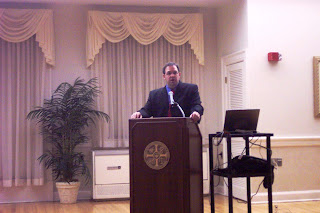
 Dr. Daniel Masters, assistant professor of political science at the University of North Carolina, Wilmington, delivered a lecture on “International Terrorism and Counterterrorism in the Post-9/11 World” at 7 p.m., Feb.19, in the McIntosh Ballroom.
Dr. Daniel Masters, assistant professor of political science at the University of North Carolina, Wilmington, delivered a lecture on “International Terrorism and Counterterrorism in the Post-9/11 World” at 7 p.m., Feb.19, in the McIntosh Ballroom.The event was sponsored by Ohio Northern’s Committee on Cultural Affairs and Special Events.
In his talk, Masters evaluated the nature of the global terrorist threat versus the varied national terrorist threats in a comprehensive way to distinguish the source of terrorist threats, regional orientations of terrorism, and the national versus truly global threats we face. He will also analyze the different global counterterrorism efforts, and the varied national responses to terrorism with a particular emphasis on the tensions between national and global counterterrorism interests and policies.
He argued that despite a promising start to forming a comprehensive antiterrorist effort after September 11th, 2001, international cooperation has been waning in recent years. According to Masters, the main reasons for this have been a lack of capacity in some nations, and the feeling that the effort had been "Americanized" focusing exclusively on Al Quaeda, which has caused some to drop out because of conflicting national interests that may not be so concerned with that terrorist organization.
Masters presented data that indicated the two chief contributers to international terrorism were failed states and weak democracies. Also according to his data, most terrorist acts are committed in Sub-Saharan Africa, with Latin America and Europe coming in second and third. During question and answer, Masters agreed with a questioner that Africa may have been weighted too high due to counting civil war deaths as terrorist attacks.
Masters received his Ph.D. in political science from the University of Tennessee-Knoxville in 2000 with concentrations in international relations and comparative politics. His research interests relate to terrorism. His research has led him to Belfast and Israeli-occupied territories to conduct interviews with terrorists, supporters of terrorist movements, and opponents of terrorist movements.

No comments:
Post a Comment